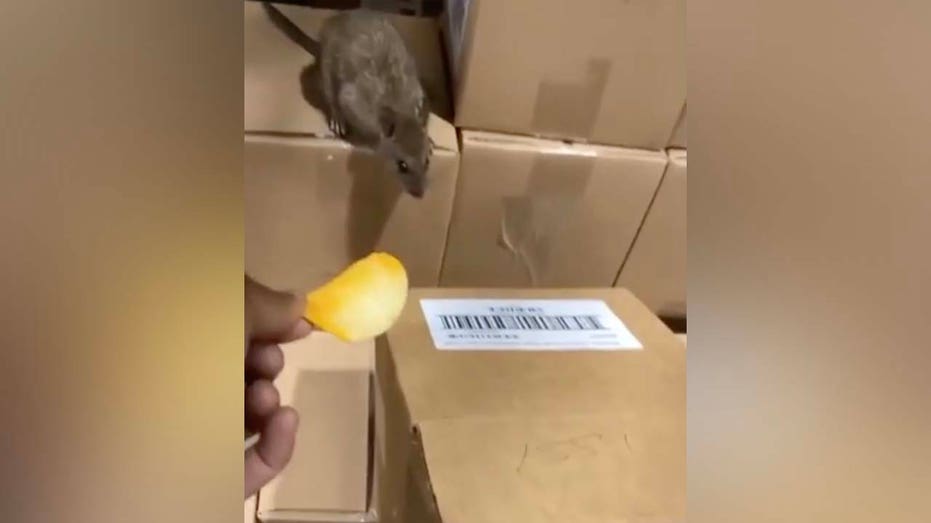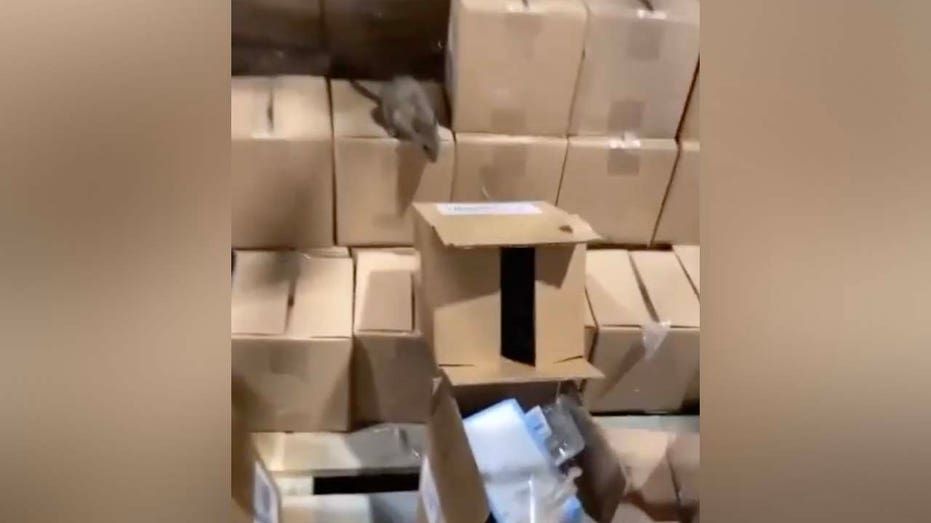
A former employee records video of rodents at a Family Dollar distribution facility.
The Department of Justice announced on Monday that Family Dollar Stores LLC has pleaded guilty to holding consumer products in a “rodent-infested warehouse.”
The DOJ released a statement Monday stating that the company pleaded guilty to holding food, drugs, medical devices, and cosmetics under insanitary conditions, related to a rodent infestation at the company’s West Memphis, Arkansas, distribution center.
The company has also agreed to pay $41.675 million, which the DOJ said is the largest-ever monetary criminal penalty in a food safety case.
Criminal information was unsealed in federal court on Monday, charging Family Dollar with one misdemeanor count of causing FDA-regulated products to become tainted while being held under insanitary conditions.
FAMILY DOLLAR RECALLS SEVERAL PRODUCTS AFTER RODENT INFESTATION DETECTED AT DISTRIBUTION FACILITY

Family Dollar Stores LLC pleaded guilty today to holding food, drugs, medical devices, and cosmetics under insanitary conditions, related to a rodent infestation at the company’s West Memphis, Arkansas, distribution center. (Fox News)
“When consumers go to the store, they have the right to expect that the food and drugs on the shelves have been kept in clean, uncontaminated conditions,” said Acting Associate Attorney General Benjamin C. Mizer. “When companies violate that trust and the laws designed to keep consumers safe, the public should rest assured: The Justice Department will hold those companies accountable.”
The plea agreement also requires Family Dollar and Dollar Tree to meet vigorous corporate compliance and reporting requirements for the next three years.
“Consumers trust that products purchased from retail stores such as Family Dollar are safe,” said U.S. Attorney Jonathan D. Ross for the Eastern District of Arkansas. “It is incomprehensible that Family Dollar knew about the rodent and pest issues at its distribution center in Arkansas but continued to ship products that were unsafe and insanitary.”
Ross went on to state that knowingly selling these types of products not only places the public’s health at risk but ruins the trust consumers have in the products they purchase.
ARKANSAS FAMILY DOLLAR FACILITY TIED TO RODENT INFESTATION CLOSING FOR GOOD

A criminal information unsealed today in federal court in Little Rock, Arkansas, charged Family Dollar with one misdemeanor count of causing FDA-regulated products to become adulterated while being held under insanitary conditions. (Fox News)
“Products shipped and sold are required to be safe for consumers and the safety of Arkansans and others are extremely important to this office. Let me be clear, if you conduct business in Arkansas and allow the shipment or sale of unsafe and insanitary products, you will be held accountable,” Ross said.
In pleading guilty, the company admitted that its Arkansas distribution center shipped FDA-regulated products to more than 400 Family Dollar stores in Alabama, Missouri, Mississippi, Louisiana, Arkansas, and Tennessee.
According to the plea agreement, the company began receiving reports in August 2020 of mouse and pest issues with deliveries to stores. By the end of 2020, certain stores reported receiving rodents and rodent-damaged products from the warehouse. The company admitted that by no later than January 2021, some of its employees were aware that the insanitary conditions caused FDA-regulated products held at the warehouse to become tainted and in violation of the Federal Food, Drug and Cosmetic Act (FDCA).
CLEANUP AT SUSPICIOUS CALIFORNIA BIOLAB WITH TIES TO CHINA CONTINUES

According to the plea agreement, the company continued to ship FDA-regulated products from the warehouse until January 2022, when an FDA inspection revealed live rodents, dead and decaying rodents, rodent feces, urine, and odors, and evidence of gnaw (Fox News)
“U.S. consumers rely on the FDA to ensure that their food is safe and wholesome,” said Special Agent in Charge Charles L. Grinstead of the Food and Drug Administration’s Office of Criminal Investigations (FDA-OCI) Kansas City Field Office. “When companies put themselves above the law and distribute food that has been held under extremely insanitary conditions, putting the public’s health at risk, we will see that they are brought to justice.”
According to the plea agreement, the company continued to ship FDA-regulated products from the warehouse until January 2022, when an FDA inspection revealed live rodents, dead and decaying rodents, rodent feces, urine, and odors, and evidence of nesting throughout the facility.
CLICK HERE TO GET THE FOX NEWS APP
Following the inspection, fumigation of the warehouse resulted in the reported extermination of 1,270 rodents, according to the plea agreement.
On Feb. 18, 2022, the DOJ reported that the company voluntarily recalled all drugs, medical devices, cosmetics, and human and animal food products sold since Jan. 1, 2021 in the 404 stores that had been serviced by the warehouse.







